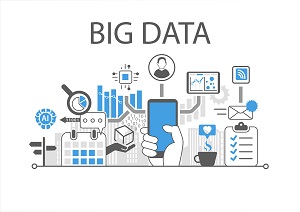Your brand identity could be the key to success or failure, especially in a crowded marketplace. Fortunately, big data can help you create a strong brand identity from scratch or identify existing weak points.
What Is a Brand Identity?
Brand identity encompasses all the visual aspects associated with a company, including its font, color scheme and logo. If you asked people from around the world to tell you what came to mind concerning McDonald’s, many would likely bring up the famous golden arches. Similarly, most consumers would probably mention the distinctive “swoosh” logo and capped name when asked to conjure a mental image associated with Nike shoes.
Some people also extend the definition of brand identity to mean a company’s personality and what makes it stand out from other options. For example, Lush Cosmetics sells bath and beauty products, but it differentiates itself in the marketplace by focusing on handmade items that don’t get tested on animals. Each product even has the name of the person who made it, complete with a cartoon likeness.
Big Data Can Explain How People Currently Perceive Your Brand
Some initial brand identity efforts fall short. For example, the results of a small consumer survey might show that people couldn’t pick your logo out of an assortment of five choices or that they get frustrated because they think your font is hard to read from a distance.
One of the advantages of big data is that it allows analyzing vast quantities of information in a much shorter time than previous methods allowed. One example that marketing researchers used recently was to learn more about customer perceptions through social media monitoring. Looking at the followers associated with a particular brand allowed seeing what social media users thought about the eco-friendliness of a personal care company or the nutrition associated with snack businesses.
Using big data to reveal what customers think about a brand now is an excellent way to determine where room for improvement exists. It can give marketing representatives opportunities to clarify misconceptions while simultaneously strengthening a brand’s identity.
Sometimes, you can even capitalize on completely unintentional things that people associate with different organizations. A couple of years ago, IHOP, the brand known for its pancakes, pulled a publicity stunt and temporarily renamed itself International House of Burgers, or IHOB for short. People immediately started commenting on how the O and B in the new logo looked almost identical to the one for OB, a feminine care brand.
Using a big data platform can allow businesses to collect and analyze what people say about a new logo or font choice. It’s then easier for them to respond if necessary or even make changes if the alteration did not have the desired effect.
Big Data May Inform Which Elements to Keep or Remove
When people want a fast-food meal from Wendy’s, they probably remember the red-headed girl with her hair in pigtails. The brand went through an identity refresh in 2012. Although the company changed its typeface and redesigned the logo, brand representatives knew it should keep the color red, as well as the slightly wavy orientation of the company’s name when printed.
If companies aren’t sure which brand identity elements are most important to consumers, big data could help. A business might spend a few months surveying people across the world about which parts of the brand identity are the most beloved or recognizable. That information could steer an organization’s choices and increase the likelihood of success.
Using big data also enables creating a more nuanced brand identity by helping companies determine what matters most to their customers, then strive to reflect those traits. If an analysis shows that a particular aspect of brand identity doesn’t further the company’s overall ideals and vision, perhaps it’s time to take it out.
Big Data Could Help Marketers Make Smarter Brand Identity Decisions
Big data can also inform marketers if recent announcements related to brand identity have positive effects on things such as purchasing rates or website traffic. In 2018, Coca-Cola announced a series of recycling-based plans to support its World Without Waste initiative.
Data offers an assortment of brand-building possibilities. Coca-Cola’s brand managers could keep an eye on metrics with help from big data platforms. Then, it should become more evident if the news of the recycling focus caused any positive changes. Any company could use big data similarly to avoid wasting time or money.
Better Brand Identity Brings Success
There’s no denying the value of a strong brand in today’s marketplace. Big data tools can point companies in the right direction as they build or improve their branding methods.
About the Author

Caleb Danziger writes about big data, AI, cloud computing and the IoT. Read more from Caleb on The Byte Beat, his tech blog.
Sign up for the free insideAI News newsletter.




